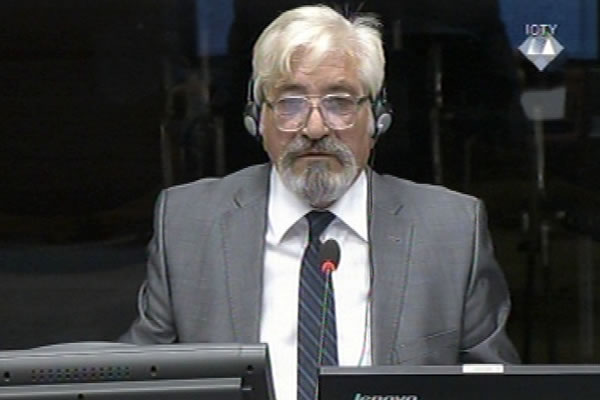Home
FORCED LABOR FOR MUSLIM PRISONERS
Desimir Sarenac, Bosnian Serb military officer, testified in Ratko Mladic’s defense today. Sarenac confirmed that non-Serb prisoners were taken to the frontline for forced labor. Some of the prisoners were killed, Sarenac agreed but denied that he was personally responsible for their fate. According to Sarenac, citizens of Sarajevo wanted the war to end but the conflict continued because of the people from Sandzak
 Desimir Sarenac, defence witness at Rako Mladic trial
Desimir Sarenac, defence witness at Rako Mladic trial In his statement to Ratko Mladic’s defense, former security officer in the 1st Sarajevo Brigade Desimir Sarenac denied that the Bosnian Serb army was responsible for the crimes against the citizens of Sarajevo. In the summary of his statement, which is for all intents and purposes a copy-paste of the testimony of previous witnesses, Sarenac said that his unit didn’t engage in offensive actions. His troops only defended themselves against the attacks from the city.
The BH Army used civilian facilities in the city for military purposes to attack Serb civilian areas, but also parts of Sarajevo under BH control to blame Serbs for those attacks, Sarenac claimed. On the other hand, according to the witness, the Sarajevo-Romanija Corps didn’t intend to terrorize the civilians in the city.
The prosecutor dedicated most of the cross-examination to the unlawful treatment of non-Serb prisoners and the practice of taking them to the front where they did forced labor. The prosecutor presented Sky News report from September 1992 showing a Muslim prisoner who says that digging trenches was the most difficult task for him because it was a ‘dangerous job’: one of the Muslims died, and two other had been injured recently. The witness admitted that he heard about‘people being used to do certain jobs’. When presiding judge Orie stressed that ‘certain jobs’could imply working as a ‘baker or a cleaner’, the witness admitted that they dug trenches.
The prosecutor went on to present several documents signed by the witness describing the use of prisoners for various tasks on the front lines. Also, the prosecutor showed the daily activity log book from the Penal and Correctional Facility in Kula. The incidents recorded in the logbook show thatnon-Serb prisoners were in danger of being wounded or killed by snipers and shells as they worked on the front line. Sarenac told the prosecutor he had known about some of the incidents, but the log book was kept by the Kula prison warden Soniboj Skiljevic. Sarenac could thus not know all those things at the time.
According to Skiljevic’s notes, the prisoners from Kula were also taken to the Slavisa Vajner Cica military barracks in Lukavica. The witness admitted that he was the commander there. Sarenac confirmed that the prisoners were brought in to perform labor but the jobs were not dangerous as the work on the front line. On 22 June 1992, 280 non-Serb prisoners were brought to the military barracks. The prosecutor presented a statement made to the Bosnian police by a lawyer from Hadzici, who was among those prisoners. The lawyer stated that on their arrival in Lukavica the beatings of prisoners began and that 48 of the prisoners were taken away. Those that remained were taken to the Kula prison some days later. Sarenac replied that he knew about the prisoners being taken to Kula. What he didn’t know was that they were beaten up or taken away. The only incident he heard of was when the prisoners were all searched, and some tuna cans were found and seized, Sarenac recounted. According to the witness, the tuna cans were soon returned to the prisoners.
Asked if any women were detained in Kula, the witness replied that he ‘didn’t know what went on there’. This prompted the prosecutor to show him an excerpt from Skiljevic’s logbook. According to the entry,Sarenac brought two women to the prison in October 1993. Sarenac recalled that one woman was from Foca and that she had been ‘brought to me to keep watch over her’. When he was ordered to do it, Sarenac took the woman to Kula. When Judge Orie asked Sarenac if she could leave the military barracks freely before she went to the prison, he said he couldn’t let her go because he had to ‘protect her’.
Replying to defense counsel Branko Lukic in the re-examination the witness said that he was not responsible for the fate of the Kula prisoners or for their transfer to the front line. Sarenac concluded his testimony saying that the ‘local population of Sarajevo’wanted the war to end quickly. However, ‘the people from Sandzak who held important posts in the state’wanted the conflict to continue.
Linked Reports
- Case : Mladic
- 2014-09-23 'VOLUNTARY' DEPARTURE OF MUSLIMS FROM ROGATICA
- 2014-09-22 ‘MY FATHER WAS CONVICTED, BUT HE IS NOT GUILTY’
- 2014-09-19 PROSECUTION REFUSES TO GIVE UP ON TOMASICA
- 2014-09-25 MLADIC’S STRAIGHT-A STUDENTS
- 2014-09-25 (UN)REASONABLE USE OF AMMUNITION IN SARAJEVO
- 2014-09-29 DEMOCRATIC PROCEDURE IN BATKOVIC PRISON CAMP
